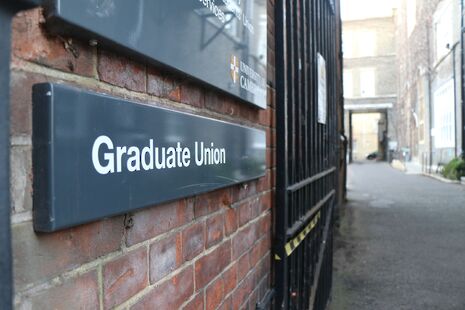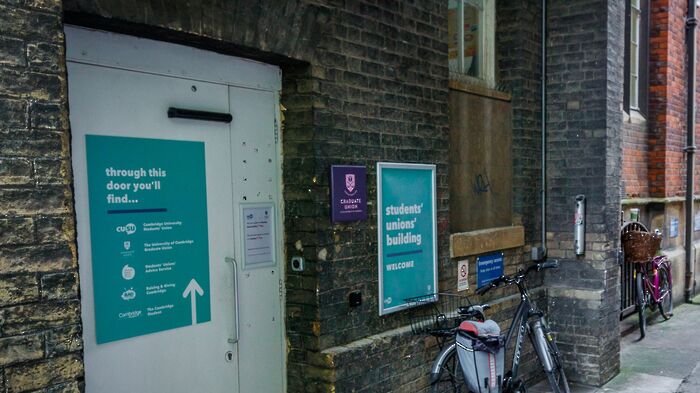Graduate application fee waivers to be introduced for students from low-income backgrounds and refugees
The Graduate Union have also blocked a move to increase application fees by 50%, which its president termed “a practical and symbolic barrier to access”

Fee waivers for graduate applications to Cambridge will be offered to British students from low-income backgrounds, as well as refugees and people with allied status. Low-income backgrounds will be assessed by students’ status when they applied for undergraduate student loans, with those who had recorded income of £25,000 or below to be offered a few waiver.
The decision, announced by the Graduate Union (GU) on 22nd February, came after lobbying from GU President Sofia Ropek Hewson, who co-wrote a paper with the Director of Admissions and Head of Graduate Admissions, which was presented and approved to the Postgraduate Admissions Committee.
The GU also announced that it had successfully stopped a proposal headed by the General Board to increase postgraduate application fees to £75 this year, an increase of 50% from last year’s fees. Instead fees will be “more modestly increased in the medium term”, according to Ropek Hewson.
A reassessment aiming to expand fee waivers for international applicants in line with the UN’s list of low-income countries, which currently exist for some countries, will also be launched.
In a comment to Varsity, Ropek Hewson described the proposal to increase graduate application fees as “practical and symbolic barrier to access” and argued that given that the weekly Jobseeker’s Allowance remains at £57.90 for those aged under 24, the proposal to increase graduate application fees “symbolised a disconnect between the University and young people”.
She added postgraduates often apply to multiple universities and so can end up paying around £60 for each, in contrast to undergraduates, who through the UCAS system pay £24 for five applications. She described the proposal as “indicat[ing] that postgraduate access wasn’t values in similar terms” as undergraduate access is.”
She said that “assessing need at postgraduate level is more complex than for undergraduate students, but Professor Paul Wakeling, who works on postgraduate widening participation at York, agrees that the method we’ve proposed is likely to be effective, and addresses a significant barrier to access.”
Ropek Hewson also drew attention to the Student Support Initiative, £300m of which is expected to be allocated to the expansion of postgraduate studentships.
She said:“The University needs to consider whether a diverse range of people will be able to access [these studentships].”
Ropek Hewson added: “This is an important step, but if the University is serious about increasing its postgraduate numbers… it needs to consider postgraduate access more thoroughly.”
“We need to bring together existing postgraduate access programmes happening locally across the University”, she said, by doing research and commissioning an “ambitious and well-funded pilot programme”.
She called for a “joined-up Financial Aid Office”, commenting that “it’s really exciting that the University has raised £79 million for postgraduate studentships, but that money won’t be distributed to those in need of support, or with postgraduate access in mind”.
Last month, Cambridge received a £100m donation from the David and Claudia Harding Foundation – one of the largest donations in recent history to a UK university – £79m of which will go towards funding PhD scholarships.
At a recent education open meeting held with the Senior Pro Vice Chancellor for Education Graham Virgo, University Councillor candidate and postgraduate student Tamzin Byrne criticised the lack of attention towards access for postgraduate students these funds will have.
 News / Right-wing billionaire Peter Thiel gives ‘antichrist’ lecture in Cambridge6 February 2026
News / Right-wing billionaire Peter Thiel gives ‘antichrist’ lecture in Cambridge6 February 2026 News / John’s duped into £10m overspend6 February 2026
News / John’s duped into £10m overspend6 February 2026 News / Epstein contacted Cambridge academics about research funding6 February 2026
News / Epstein contacted Cambridge academics about research funding6 February 2026 News / Lucy Cav students go on rent strike over hot water issues6 February 2026
News / Lucy Cav students go on rent strike over hot water issues6 February 2026 News / Corpus FemSoc no longer named after man6 February 2026
News / Corpus FemSoc no longer named after man6 February 2026











